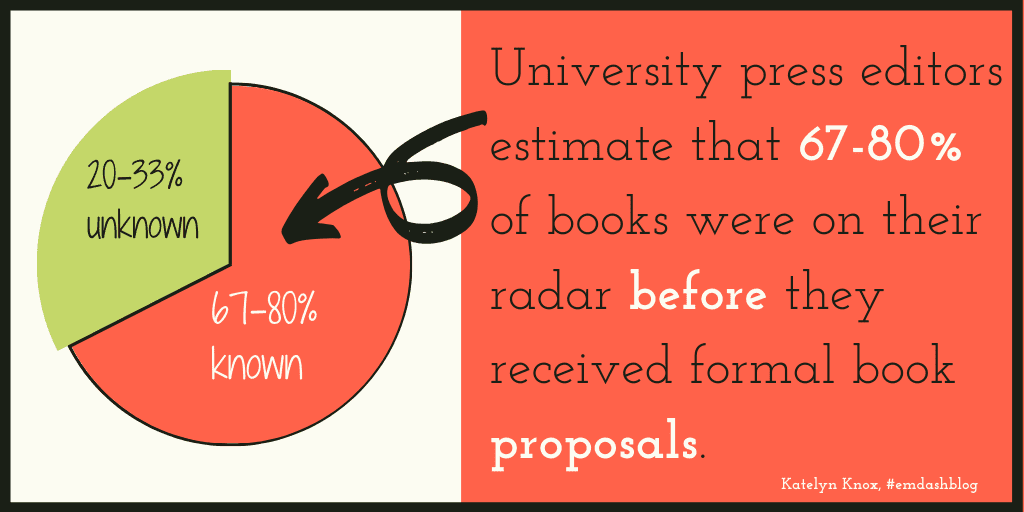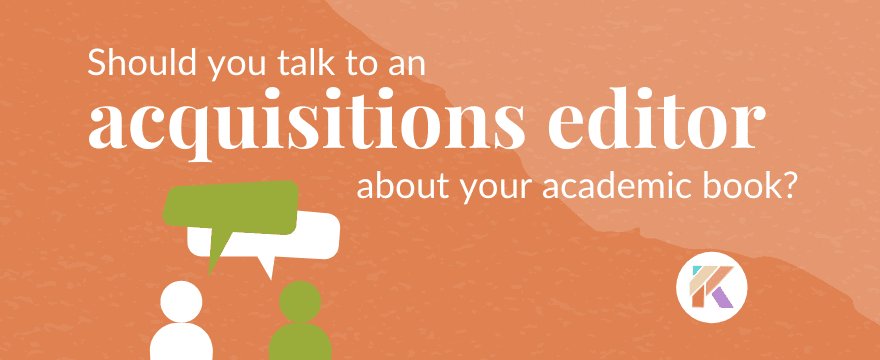When I was writing my own book, the whole publishing process felt opaque and high-stakes. I erroneously associated speaking with editors at a conference with formally “pitching” my book. Because I was strongly encouraged to wait to draft and submit book proposals until the full manuscript was (nearly) complete, I also avoided talking with editors, for fear that I would tank my book’s prospects.
I now know that this is not the best strategy.
In this post, I clarify the various forms talking with an editor about your book can take (ranging from informal, informational chats to a more formal “pitch”), tell you why you might consider chatting with editors early, and give you tips on how to contact editors and prepare for your conversation.
Is talking to an editor the same as “pitching” my book?
No. Talking to an editor can range in formality. It can be a very informal chat (where you lay out a bit about your book and learn more about that press) to more official conversations about your book’s fit for and chances at that press.
Hear what editors have to say on this exact topic.
Why might I want to talk with an acquisitions editor about my book?
Talking to editors serves several purposes. First, whether you chat early or closer to the proposal stage, talking with an acquisitions editor at a conference can help your project get on an editor’s radar. In a round table, acquisitions editors in philosophy revealed that they were already familiar with 67–80% of books for which they received a formal proposal.

Second, editors will often tell you about the publication process at your press. If you’re on a tight tenure timeline or have unique book features, they can help you understand whether publication with their press would even be possible. (Before chatting with editors, be sure to clarify in what state you need the book to be for tenure.) Additionally, most editors will give you information to help you understand when you should submit a proposal to their press, specifically.
You can also get quick feedback about your project. Many authors have reported that an editor told them their project sounded like two books for two different audiences. Receiving this piece of feedback helped them strengthen their project, which was still welcomed by those editors. Other authors have gotten a better sense of the editor’s priorities, which, in turn, helped them strengthen their book proposal.
Finally, in some cases you can glean timely information about the list’s direction (and sometimes the editorial board’s priorities). For instance, the editor might say that while your project is a good fit for the books they used to acquire, they’re now moving toward projects in one small subset of your area. Or, they might tell you that the board has become highly critical of projects studying only men (and not women). This information can help you decide whether to continue considering that press a target outlet.
When should I plan to talk with an acquisitions editor about my book?
There is no one-size-fits-all answer to this question, and you might have several conversations with editors over the years. The answer depends on the press and your project’s parameters. You can certainly stop by the booth and chat with editors about your project quite early, as you heard in the round table clip above. That said, you should at least have a sense that your project could possibly be a good fit for that press.
For more serious conversations (and appointments), you should be closer to the book proposal stage. You should know what your book is and does and who it’s for. You should also have a clear sense of how the project could be a good fit for that press. Finally, you should have some questions you’re interested in asking the editor (usually about the publication process there).
How and when should I initiate contact, relative to the conference?
If you are quite early and want to chat casually with the acquisitions editor, you can feel free to stop by the booth. Try going when panels are in session.
If you are closer to the proposal stage and would like to chat more seriously with the editor, you should reach out a few weeks in advance to make an appointment with the editor. Keep your email short. Use the following template as a starting point.
Dear [editor],
I’m an [title] of [subject] at [institution] and I’m writing because I am working on a book manuscript titled [title]. Drawing on [corpus], [title] [main claim in one sentence]. [Stakes/ Significance in one sentence].
I identified [press] as a possible outlet for [title] because [reasons]. I will be attending the [upcoming conference] and so, wanted to see if you would also be attending [conference] and, if so, whether you would be available to meet regarding this project.
I look forward to hearing from you regarding your availability.
Most sincerely,
Know that editors will be considering fit above all else in evaluating these requests. If the project sounds promising, but not a good fit for the types of books the press publishes, the editor is unlikely to schedule a meeting with you. Some will offer helpful suggestions about other presses that might be a better fit for the project. So, before requesting a meeting with an editor, do be sure you understand how presses see your book and verify that the press publishes books like yours.
How is talking with editors different in a (post-)COVID era, when conferences are canceled or virtual?
Most editors are more than happy to coordinate Zoom or telephone chats with authors, whether they coincide with conference meetings or not. If you will be at a conference (virtually or physically) and want to chat with an editor, do reach out in the context of the conference. Increasingly, editors are also willing to make more formal appointments with book authors outside of the context of conferences.
Help! The conference is next week and I didn’t email in advance. What should I do?
Don’t worry. You can still email in advance, but plan to stop by the booth. And, as Bridget Barry, editor in chief at the University of Nebraska Press helpfully reminds authors (in the round table clip above), go when sessions are happening–the booths tend to be much quieter!
How should I prepare to chat with the acquisitions editor? What will they ask?
If you’re earlier on and hope to have only a quick chat with an acquisitions editor, you should prepare to describe your topic, main claim or argument (in a sentence, not a paragraph), and your chapters’ main contributions or interesting evidence (also in a sentence). If you have an appointment, you can present a slightly more in-depth version.
They will likely ask follow-up questions about your content and audience. Consider the following questions:
- Who else, beside historians of [place, time] would be interested in this book?
- What’s the significance of this study? How does it fit with the existing scholarly terrain?
- Why did you choose to end the book in 1987?
- Do you discuss gender at all in the book?
- Tell me more about your book’s structure.
- I’m really intrigued by your third chapter. Tell me more about its main case.
- It sounds to me like the fourth chapter is a bit different from the others. How does it fit?
See also Karen Kelsky’s in-depth post on “How to Pitch Your Book to an Editor at a Conference.”
What might I consider asking?
You will definitely want to get a sense of the press’s publication timeline. If your book has unique parameters–like a lot of images or color images, which can make a book prohibitively expensive for a press–you might ask whether the press would be able to accommodate those. You can also inquire about other factors, like distribution (if, for instance, you hope that your project be available in the country about which you’re writing), or a book website.
What might happen after I chat with the acquisitions editor?
The outcome will depend on many factors.
If you’re fairly early on and speaking more informally with the editor, you should leave with a better sense of whether that press is really a target outlet. You might also leave with a few points to consider about your project (say, for instance, they remarked that it sounded like you are writing two books). If the project sounds promising and a potential good fit, the editor will likely tell you that they would welcome a proposal when you get to that stage.
If you’re closer to the proposal stage, you should leave with a good sense of whether that press would be a good outlet, given your specific timeline and project’s parameters. If the editor doesn’t think the project will be a good fit, they might recommend other presses that would be a better fit.
What else should I know?
Chapter 4 of William Germano’s Getting it Published, 3rd edition, contains an enormously helpful section on “Book Exhibits.” Though the broader chapter aims to help authors identify target presses, this section tells you exactly what to expect from a meeting.
It answers your questions like: how much depth should I go into? Should I bring a packet? Should I follow up? If so, how? What if the editor says “it’s not for us”?
